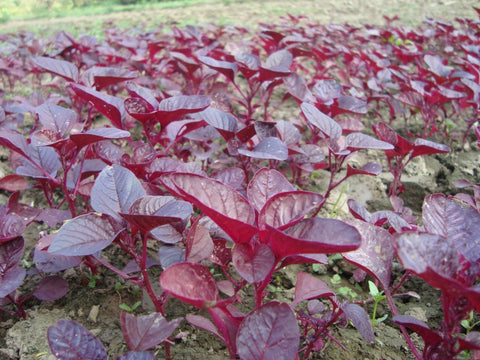Say YES to NO (Nitric Oxide)
Nitric oxide, what is it and why do you need it?
Proposition nitric oxide is on the ballot, and we’re sharing all the facts that will help you understand some basics and leave you saying YES to NO (nitric oxide).
Nitric oxide, what is it?
Nitric oxide is a small gaseous molecule also known as nitrogen monoxide, one nitrogen bonded to one oxygen, with the chemical formula NO.
Okay. Chemistry Class is over. You came here because you were curious about functional foods that might improve your health, so let's start with a little history for a fun distraction.
Nitric oxide was first identified as a gas by Joseph Priestly in 1772. Most of that time, it was just considered an atmospheric pollutant. But nature has its complications and its mysteries that we are only starting to uncover on many topics, including nitric oxide.
In the 1980s, scientists, in their curiosity and methodological plodding, wondered how blood vessels dilate (or relax), aka vasodilation - an important factor that controls the pressure of our blood.
In 1980 Robert Furchgott was looking at the role of a drug called acetylcholine. He found relaxation of blood vessels only occurred if a special class of cells called endothelial cells were present.
Another researcher, Ferid Murad was trying to figure out how nitroglycerin works. He discovered that it can release nitric oxide, which in turn was able to cause relaxation of smooth muscle cells.
Finally, in 1986 Louis Ignarro found that the Endothelial Derived Relaxing Factor or EDRF (a name for an unknown factor allowing relaxation of endothelial cells) had identical properties to the gas nitric oxide.
This was the first time that a gas had been shown to play an important role in regulating biological functions in humans. For their role in this discovery Furchgott, Murad and Ignarro were awarded the Nobel Prize for Medicine or Physiology in 1998.
For a good two decades now, nitric oxide has led a revolution in physiology and pharmacology research. Our bodies have been teaming up with this amazing molecule and converting the nitrate in certain vegetables into nitric oxide a lot longer.
Think of it in terms of nature's magical wonders.
Why should I care about nitric oxide?
That's a good question. Do you want an active lifestyle? Looking to be a top athlete? Maybe you just want to feel good?
There has been a champion lurking in your body, and in a fraction of a second, when you might swallow, it comes to life and then quickly transmits a message to your body's cells before disappearing in another fraction of a second. Yes, nitric oxide (NO) is a widespread signaling molecule that participates in virtually every cellular and organ function in the body. It is essential for biological processes throughout the body. The fact is, nitric oxide's role in blood flow and overall health is absolutely essential, no matter your lifestyle.
Not convinced you should care yet?
Though not a topic of everyday discussion, nitric oxide gets produced in nearly every cell type in the human body and is one of the most important molecules for blood vessel health. Blood flow is kind of important, okay extremely important for your heart, kidneys, brain, and muscles. Let's take a look at just some of the functions NO impacts.
Nitric oxide’s impact on the body
Cardiovascular system ✔
-Relaxes vascular smooth muscles and reduces blood pressure.
Nervous system ✔
-Increases cerebral blood flow and oxygenation to the brain.
-NO in the brain regulates many physiological processes affecting behavior and cognitive function.
Lungs ✔
- Beneficial in opening pulmonary vessels and circulating oxygen.
Muscles ✔
- From an athlete’s point of view, nitric oxide’s primary role is to regulate the delivery of oxygen to muscles - it does this by relaxing and opening blood vessels, subsequently improving blood flow.
- Improves exercise tolerance and mitochondrial functions and has anti-inflammatory potential.

How is Nitric oxide produced?
The oxidation of nitrogen forms nitric oxide (NO). Nitric oxide performs essential chemical signaling functions in humans and other animals and has various applications in medicine.
Humans produce nitric oxide by several mechanisms like breathing in through the nose and physical exertion. One main way is through the high nitrate functional foods we eat. Dietary plant-based nitrate converts to nitrite in the back of the tongue and then to nitric oxide in the upper gastrointestinal tract. Helping the process along as precursors are amino acids, such as L-arginine. L-arginine is found naturally in inorganic nitrate-rich foods such as green leafy vegetables, fruits, nuts, seeds, and some whole grains. Additionally, another amino acid that assists in nitric oxide synthase is found in nuts, legumes, and watermelon is called L-citrulline, pronounced ‘sit-true-lean.’ I bet you can’t say that without a smile. Yay, functional foods.

What does nitric oxide do in the body?
The bigger question might be, what function doesn’t nitric oxide play in your body? Researchers are only just uncovering the expanse of NO at work in various bodily systems. What we do know is that nitric oxide is a widespread signaling molecule that tells muscles to relax or dilate—sending a healthy blood flow to your heart, kidneys, brain, and muscles. Nitric oxide (NO) participates in controlling contractility and heart rate - that essential pump for our circulatory system. One vital muscle, indeed.
NO in the brain regulates many physiological processes affecting behavior and cognitive functions. Controls brain blood flow and crosses cell membranes freely as a neurotransmitter in the brain, keeping us sharp.
Again, nitric oxide works in regulating many cellular functions, including the function of skeletal muscle. Several studies have demonstrated that enhancement of skeletal muscle NO signaling can increase exercise performance.
How does nitric oxide cause vasodilation?

You might’ve heard the term vasodilation; it’s the widening of blood vessels. It’s a natural process that happens in our bodies. Nitric oxide (NO) is part of that daisy-chain of bodily functions.
Here’s a note from Thomas Burke, Ph.D.
“NO initiates and maintains vasodilation through a cascade of biological events that culminate in the relaxation of smooth muscle cells that line arteries, veins, lymphatics.”
What are the best ways to boost nitric oxide levels?
There are multiple ways to maintain and boost nitric oxide in your body. A very natural method is to eat vegetables high in nitrate. Examples include green leafy vegetables such as red spinach and lettuce and fennel, rocket, radishes, Chinese cabbage, parsley, celery, cress, chervil, and arugula. Two stars in this area are Red Spinach and Beetroot, being particularly rich in nitrate.
Part of the varied diet that we all need to boost and keep nitric oxide production high in our bodies is to eat foods that promote antioxidants. Good ol’ Vitamin C and Vitamin E can help. Seek ingredients that help form nitric oxide in your body, like L-arginine and L-citrulline (amino acids).
Avoid mouthwash. Mouthwash is a killer of the good bacteria that help produce nitric oxide.
Lastly, keep your blood flowing with exercise. Engaging in regular physical activity can improve your endothelial function and thus your natural production of nitric oxide.
When is the best time to boost nitric oxide?
Anytime is a good time to boost nitric oxide levels. Especially considering that as we age, we lose the natural capacity to produce our own NO. You can have some dietary nitrate at the start of your day, before your workouts, or before a big brain push at work or creatively.
A good general guideline is to have a plant-based meal or drink before you exercise. You will want a little something to get the metabolism rolling, not to mention help your body perform better and recover faster after each workout. In a big hurry, you can hydrate and pack some nutrition in with an energy bar or a juice such as a performance drink containing Beet Boost.
Good nutrition is critical; functional foods are essential. Visit our shop for functional food support.





Comments (1)
I recently ordered a container of beet boost with tart cherry as my current supply is at 20 percent.
I’ve been blending a tablespoon of beet boost in a cup of unfiltered organic apple juice every day for a month now. Subtle changes include reduction in blood pressure and clarity of thought.
I was introduced to the product by my cousin, who sent me a bottle as a gift.
First thought was yuk ! My grandmother used to overcook beets and I was forced to eat them. Ugh – that taste…
This is different. Taste is actually quite appealing.
At lacked an understanding of the power that finely ground beet root and tart cherry has on my vascular system.
Also i practice avoiding mouthwash and fluoride for a period before and after- swishing the juice cocktail around in my mouth and under tongue in order to optimize. Glad to have beet boost in my tool chest of available natural products that actually no the job as intended.